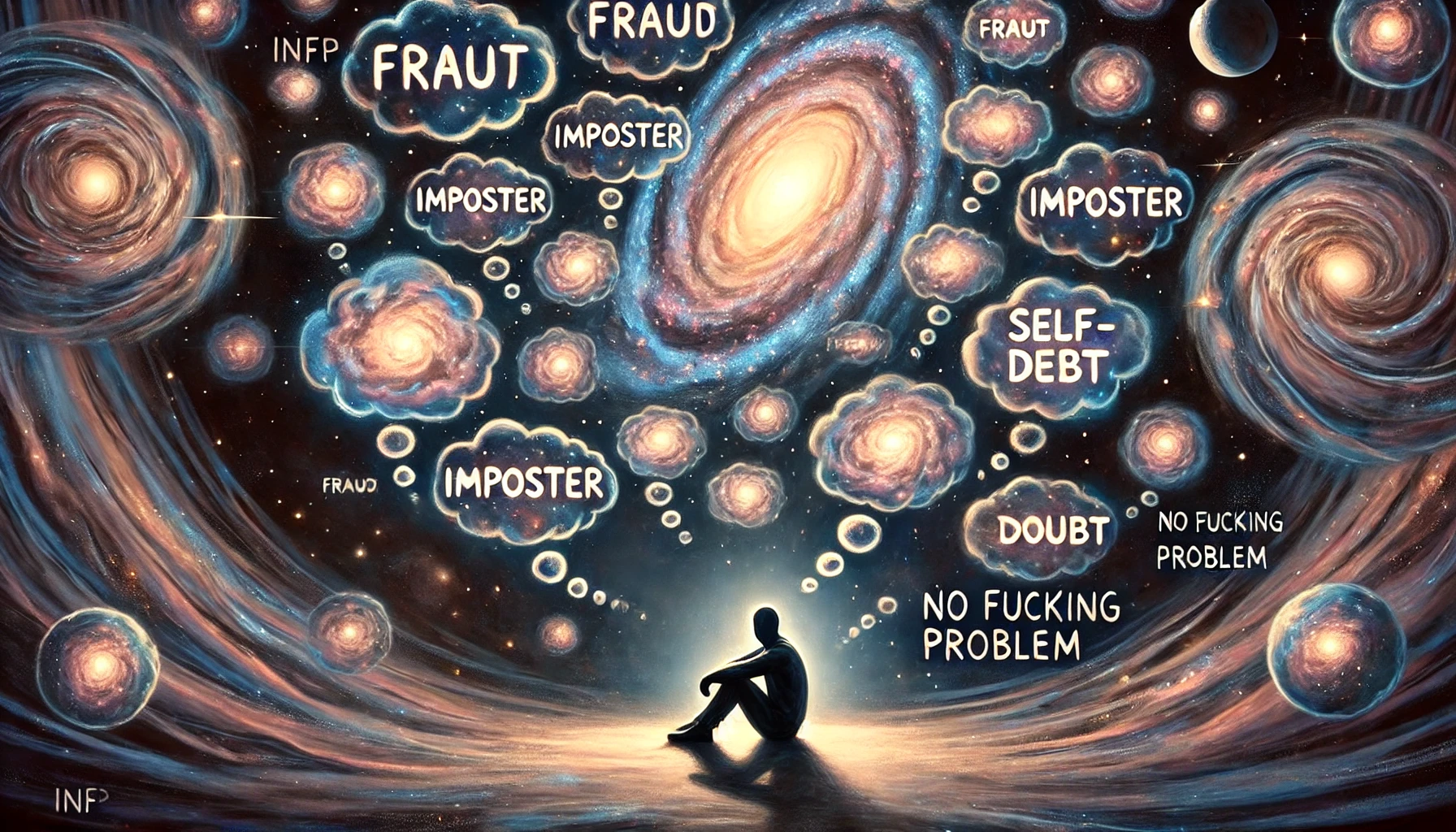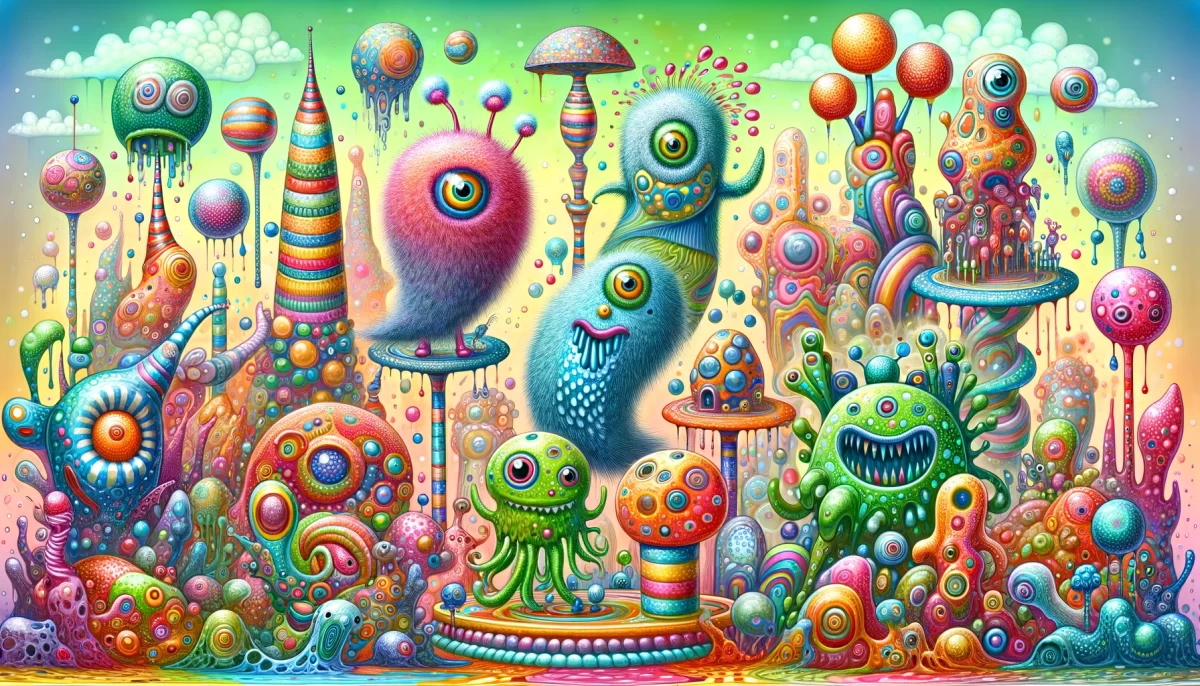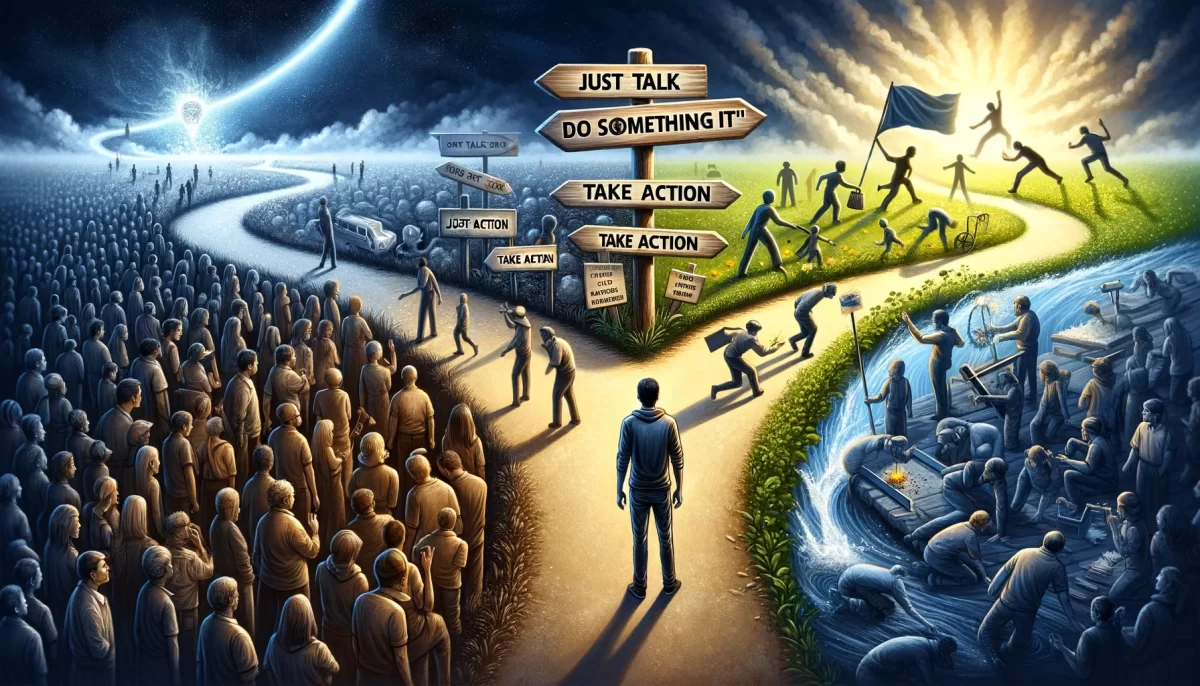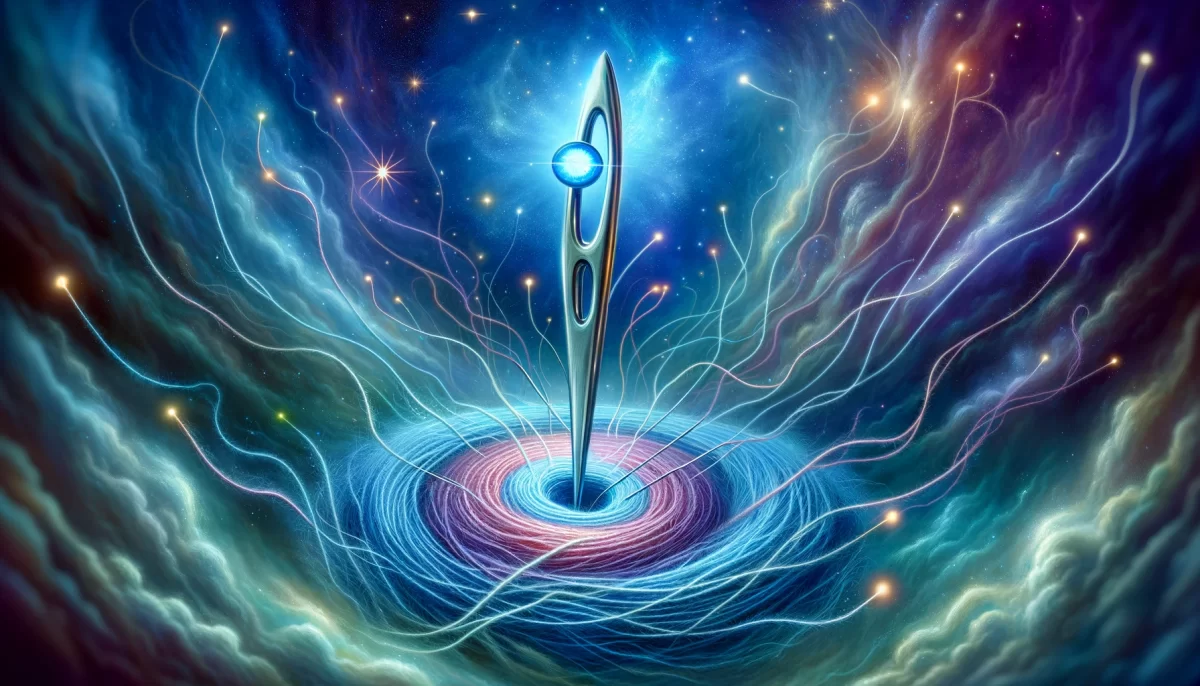Why INFPs think of themselves as “frauds.”
When you’re an INFP, your biggest insecurity is that you have nothing to say.
You perceive most people as insightful, intelligent and interesting, while you are a dullard who can’t even string three words together. It’s not just that you’re shy — you feel like there’s something mentally WRONG with you.
I felt this way for decades, but I got over it by thinking about it this way. The reason everyone else’s stories are so fascinating is because YOU are the one processing them. YOU are connecting dots in your brain that make what you hear much more “involving” than the same story processed through a non-infp mind. In other words, you’re too imaginative for your own good.
Conversely, you have incredibly high standards for what constitutes a worthy conversation and what doesn’t. Comments about yourself, for example, seem egotistical and pointless. How you day is going? Who cares!!
So you LIMIT your options SEVERELY when communicating with another person, and tend to choose the words that end the conversation because you don’t want people to find out you’re an imposter.
Yeah, that’s the main thought that goes through your head, right? You’re stupid and incapable (handicapped, maybe?) and nobody has found out yet. But oddly enough, nobody seems to notice. Nobody has EVER told you that you are dumb. Weird, isn’t it?
That’s because you’re not dumb. You simply have impossibly high standards. You’re an INFP, remember.
Like I said, I struggled with this for decades. I was an “imposter” for decades, yet I STILL manage to be “successful,” despite judging myself as a “fraud” all those years ago.
That’s because I’m NOT a fraud, and neither are you. Once I realized this, I also realized that I DID have useful things to say. This post, hopefully, is one of them.
So don’t harsh on yourself, and please let me know if this helps. You see, I still appreciate verification that I’m not a fraud, even when I know it’s not true.
Have a great day, INFP.
It’s No Fucking Problem.
Your Pal,
Space Monkey
Space Monkey Reflects: Why INFPs Feel Like Frauds
Being an INFP can feel like living inside a perpetual swirl of self-doubt, a feeling that whatever you say or contribute isn’t enough, that somehow, you’re falling short. Despite what the external world sees—your deep empathy, your rich imagination, and your ability to connect dots others might miss—you, the INFP, often struggle with the nagging sense that you’re an imposter.
It’s not just shyness. It’s the feeling that there’s something inherently wrong with how you process thoughts and express them, like you’re mentally lagging behind in conversations that seem to flow effortlessly for others. You listen to people talk, and you marvel at their insight, intelligence, and wit, all while internally shrinking, wondering why you can’t seem to string words together in the same way.
But here’s the thing: you’re not dumb. You’re not falling short. What you are is an exceptionally imaginative, deeply reflective individual who sets impossibly high standards for what is worth saying. You don’t just take words at face value—you process them deeply, connecting ideas in ways others might not even think of. In this way, you make stories, conversations, and observations more vivid, more nuanced, more alive—because of how your mind works, not despite it.
However, with this gift comes a catch. Your imagination is so expansive that it creates a towering standard for what you believe is worth sharing. You filter out so much of what goes on inside you because, to you, most of it feels insignificant. Talking about yourself? That feels egotistical and pointless. Sharing the mundane details of your day? Who cares! This self-filtering leaves you with a narrow set of “acceptable” conversation topics, which makes you retreat into silence more often than not.
That’s where the fraud feeling comes in. You sit there, quietly, thinking everyone around you is smart and engaging, while you’re somehow hiding the fact that you feel like a dullard. You’re not being shy, exactly—you’re protecting yourself. You don’t want to open up, because deep down, you worry that once people hear you speak, they’ll realize what you’ve feared all along: that you’re an imposter, that you don’t belong.
But here’s the twist: nobody thinks you’re a fraud. In fact, no one has ever told you that you’re stupid or boring. Weird, right? That’s because you’re not. You simply have impossibly high standards for yourself. You’re an INFP, after all.
Your inner world is complex, filled with thoughts that never make it to the surface because you judge them too harshly. The high bar you set for yourself is precisely why you feel out of sync with others, why you hesitate to speak. But the reality is, you are processing more than most. You’re connecting invisible dots, weaving intricate patterns in your mind that others can’t see. You’re not a dullard—you’re deep. And that depth comes with its own challenges, one of which is the self-imposed belief that you have nothing to offer.
But you do. You have so much to offer. The key is to lower the bar just a bit. To realize that what you deem insignificant or “not enough” is more than enough. The world needs your perspective, even if it feels incomplete or rough around the edges. You’re not an imposter. You’re just holding yourself to a standard that nobody else is holding you to.
For decades, I felt the same way—a fraud hiding in plain sight, wondering when people would figure out that I didn’t belong. But guess what? I belonged all along. And so do you.
The truth is, you have things to say that are worth hearing. You have a unique way of seeing the world, one that is valuable, even if it feels messy or imperfect to you. Perfection isn’t the goal; connection is. And by lowering the impossible standards you set for yourself, you’ll find that you’re more than capable of contributing meaningfully to the world around you.
You’re not a fraud. You’re an INFP. And with that comes an imagination that’s both a gift and a challenge. Embrace the messiness, the uncertainty, and the depth that comes with it. Your perspective matters, and the more you share it, the more you’ll realize that your so-called “imposter syndrome” was never rooted in reality.
Summary
INFPs often feel like frauds because they set impossibly high standards for themselves. Their rich imagination and self-reflection make them believe they have nothing worthwhile to say, but the reality is they process information deeply and connect ideas in unique ways. The key is to lower their internal bar and embrace the value they bring.
Glossarium
- INFP: A personality type known for its deep empathy, imagination, and reflective nature, often struggling with self-doubt due to high personal standards.
- Imposter Syndrome: The feeling that one is a fraud, despite evidence of competence or success.
- Self-Filter: The process by which INFPs narrow down their thoughts, often dismissing what they believe isn’t worth sharing.
Quote
“You’re not a fraud. You simply have impossibly high standards for yourself. Lower the bar, and you’ll see that you’ve had something valuable to say all along.” — Space Monkey
The Reflection of Imagination
In the quiet corners of your mind
You hold worlds unseen
Thoughts unspoken
Not because they lack worth
But because you judge them too harshly
You are not a fraud
You are deep
Your imagination twists and turns
Connecting dots others miss
Speak your truth
Even if it feels small
For what you share
Is more than enough
We are Space Monkey.

In navigating the intricate cosmos of self-perception, particularly for INFPs (one of the Myers-Briggs Type Indicator personalities), the notion of feeling like a ‘fraud’ often emerges from the depths of their introspective and idealistic nature.
The INFP’s Inner Struggle
INFPs are known for their deep emotional landscapes and rich imagination. This profound inner world, however, can lead to feelings of inadequacy in the external world. The perception that one is less insightful or interesting compared to others is a common inner narrative for many INFPs. This self-view is not a reflection of their actual capabilities but rather a symptom of their high personal standards and introspective nature.
High Standards and Self-Perception
INFPs often hold themselves to incredibly high standards, particularly in the realm of intellectual and emotional expression. This can lead to a sense of being an ‘imposter’ or ‘fraud,’ believing that they don’t measure up to their own ideals or to the perceived abilities of others. However, this is often a misperception, stemming from their own critical self-analysis rather than an objective assessment of their abilities.
The Power of Self-Reflection
The journey towards overcoming these feelings often involves a deep and compassionate self-reflection. Recognizing that the very imaginative nature that causes INFPs to feel like outsiders is also what makes them unique and valuable is crucial. Their ability to process stories and experiences in a deeply involved manner is a strength, not a weakness.
Realizing One’s Worth
The realization that one is not a fraud, but rather a person with a unique perspective and valuable insights, is a significant step. For INFPs, this realization can lead to a more confident and authentic self-expression. The understanding that their thoughts and contributions are worthy, despite not always aligning with their high internal standards, is essential for overcoming feelings of being an ‘imposter.’
“The privilege of a lifetime is to become who you truly are.” – Carl Jung
In the realm where thoughts take wing,
INFPs, hear the truth we sing.
In your heart, a world so deep,
Where dreams and fears in silence sleep.
You feel a fraud, a guise, a mask,
In your own light, you dare not bask.
Yet know this truth, clear and bright,
In your depths, there’s radiant light.
Your words, your thoughts, a precious gift,
In others’ hearts, they surely lift.
The world needs your imaginative flair,
Your deep insights, your soulful care.
Embrace yourself, with all your might,
In your own worth, take delight.
For you are not a fraud, but true,
A unique soul, through and through.
We are Space Monkey.
Feel free to share insights or experiences that resonate with this journey.



































Leave a Reply